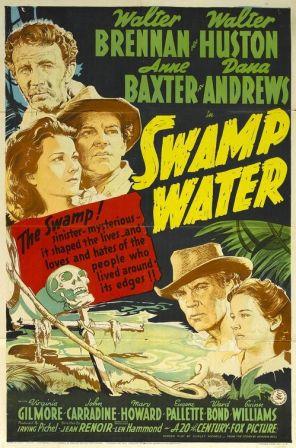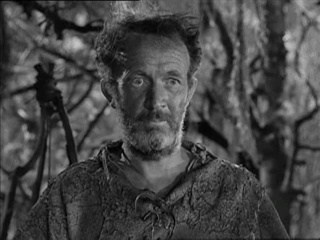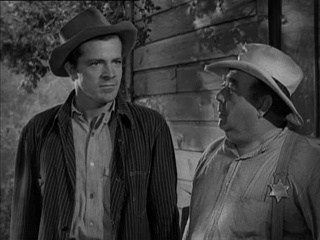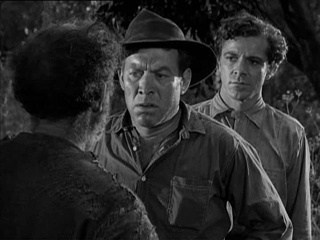 1941’s Swamp Water is a great example of the product not coming as advertised. From the title and the promotional materials, including the theatrical poster, you’d think this is a typically substandard B-grade horror picture. Granted, those sometimes schlocky horror pictures can be a great guilty pleasure, but sometimes they aren’t exactly what you have in mind. This viewer has had it sitting untouched in his iTunes library for over two years, dusty and unwatched in large part because the time wasn’t right for a horror flick. (Granted I never researched it or I would have learned otherwise.)
1941’s Swamp Water is a great example of the product not coming as advertised. From the title and the promotional materials, including the theatrical poster, you’d think this is a typically substandard B-grade horror picture. Granted, those sometimes schlocky horror pictures can be a great guilty pleasure, but sometimes they aren’t exactly what you have in mind. This viewer has had it sitting untouched in his iTunes library for over two years, dusty and unwatched in large part because the time wasn’t right for a horror flick. (Granted I never researched it or I would have learned otherwise.)
Luckily for Swamp Water, even the poster’s hints of bog-beasts and swamp creatures give you hints of things which peak one’s curiosity. We’ve got a strong cast in dual Walters – Brennan and Huston, Anne Baxter and Dana Andrews. Once you pop it on, you’ll be surprised by a strong cast of supporting players, with enough folks from the John Ford troupe to almost make you wonder if you’re embarking on a Ford epic! Among these supporting characters are John Carradine, Eugene Pallette and Ward Bond.
What Swamp Water lacks is a strong story, though what we have isn’t awful by any means. Dana Andrews as the protagonist in the story is Ben, the son of Thursday (Walter Huston) and Hannah (Mary Howard). To be completely transparent, Hannah is his stepmother. The family lives in a small (think intersection) town on the fringes of the Okefenokee swamp.
 Things get going when Ben heads into the swamp against his father’s wishes to find his dog Trouble. Heading deep into the swamp, he finally finds Trouble but also fugitive Tom Keefer (Walter Brennan). Keefer escaped to the swamp after being convicted of a murder. Ben and Tom strike up a friendship and agree to become partners in the trapping trade.
Things get going when Ben heads into the swamp against his father’s wishes to find his dog Trouble. Heading deep into the swamp, he finally finds Trouble but also fugitive Tom Keefer (Walter Brennan). Keefer escaped to the swamp after being convicted of a murder. Ben and Tom strike up a friendship and agree to become partners in the trapping trade.
Over time the small town learns that Ben’s great hides are coming from the swamp and that Tom’s involved. Unwilling to reveal Tom’s location, Ben becomes an outcast and ultimately becomes smitten with Tom’s daughter Julie (Anne Baxter). Though few in the community know of Julies parentage Ben shares his secret with her.
 With pressure mounting to lead the sheriff- Eugene Pallette in another of his quality but exceedingly uniform roles- Ben learns that the Dorson boys along with Jesse Wick (John Carradine) actually committed the murder and then set Tom up for it. Ben heads back into the swamp to retrieve Tom, but unknowingly is followed by the Dorson boys, who are still hell bent on killing Tom and wouldn’t mind extending the same courtesy to Ben.
With pressure mounting to lead the sheriff- Eugene Pallette in another of his quality but exceedingly uniform roles- Ben learns that the Dorson boys along with Jesse Wick (John Carradine) actually committed the murder and then set Tom up for it. Ben heads back into the swamp to retrieve Tom, but unknowingly is followed by the Dorson boys, who are still hell bent on killing Tom and wouldn’t mind extending the same courtesy to Ben.
Tricking the boys to give chase, Ben and Tom lead them to a bog, into which one of the boys falls and ultimately drowns – in a surprisingly violent scene for the period. Now outnumbered Tim Dorson (Ward Bond) finally confronts Ben and Tom, who give him an ultimatum. Tim can live alone as an outcast in the swamp or die, while Tom returns back into society, his redemption complete.
Swamp Water was director Jean Renoir’s first American picture and is somewhat overlooked in his canon, a perspective which is only partially justified by the final result. Granted, Renoir didn’t choose it as his project nor was it completely his. Darryl F. Zanuck meddled quite a bit in production, so much so that Irving Pichel directed the final scene depicting Julie and Ben enjoying a town dance while a smiling Tom looks on approvingly.
 Though somehow this final tacked on scene doesn’t entirely fail the picture, it is definitely out of touch with the atmospherically somber depiction that Renoir created- full of deep shadows and textures which sometimes even threaten to overtake the on-screen action itself.
Though somehow this final tacked on scene doesn’t entirely fail the picture, it is definitely out of touch with the atmospherically somber depiction that Renoir created- full of deep shadows and textures which sometimes even threaten to overtake the on-screen action itself.
What Renoir does create is a world full of angst and struggle- no one is completely happy and everyone we see is frustrated almost to the breaking point. Frequently this boils over such as when Thursday and Ben argue about Ben’s trips to the swamp or when the sheriff and his gang nearly drown Ben in a futile attempt to force him to reveal Tom’s location. In a story full of Biblical symbolism it is perhaps the reclusive and isolated Tom who is nearest to happiness.
Though sometimes considered as miscast in Swamp Water, Walter Brennan quickly becomes the glue that holds the picture together, even more so than the lead Dana Andrews. His gravelly tone and humorous bent, coupled with the de rigueur slapdash attempts at a down home dialect make you want to learn more, a yearning that sadly never gets quenched. Read More